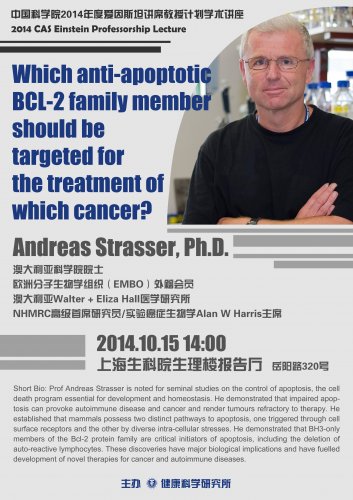主 题:Which pro-survival BCL-2 family member should be targeted for the
treatment of which cancer?
主讲人:Andreas Strasser,Ph.D.澳大利亚科学院院士
时 间:2014年10月15日 14:00
地 点:岳阳路320号 上海生科院生理楼报告厅
简 介:G Kelly, S Glaser, PN Kelly, S Grabow, A Delbridge, JM Adams, M
Herold, and A Strasser
The Walter and Eliza Hall Institute of Medical Research, 1G Royal
Parade, Parkville, VIC 3050, Australia
Impaired apoptosis is considered one of the prerequisites for the
development of most, if not all, cancers, but the mechanisms that
guarantee the sustained survival of most cancer cells remain
unknown. Members of the Bcl-2 family are key regulators of
apoptosis and include proteins essential for cell survival and
those required to initiate cell death. Studies with transgenic mice
have shown that over-expression of Bcl-2 or related pro-survival
family proteins, such as Bcl-xL or Mcl-1, can promote
tumorigenesis, particularly in conjunction with mutations that
deregulate cell cycle control, such as deregulated c-myc
expression. It is, however, not known whether expression of
pro-survival Bcl-2 family members under endogenous control is
required to maintain the survival of cells undergoing neoplastic
transformation. Using E?-myc transgenic mice, a well-characterized
model of human Burkitt‘s lymphoma, and mice, we investigated the
role of endogenous Bcl-2 in lymphoma development. Bcl-2 was found
to be dispensable for the development of E?-myc pre-B/B lymphoma.
In contrast, loss of Bcl-xL and even more remarkable, loss of a
single allele of Mcl-1 greatly impaired lymphoma development.
Experiments with inducible knockout mice demonstrated that Mcl-1
but not Bcl-xL is essential for the sustained survival and
expansion of Myc-driven malignant pore-B/B lymphoma. Remarkably,
even loss of one Mcl-1 allele greatly impaired lymphoma growth.
These findings were translated into using lymphoid malignancies by
using inducible expression of selective antagonists of distinct
pro-survival Bcl-2 family members. Such studies showed that Mcl-1
is also critical for the sustained survival and expansion of
Burkitt Lymphoma, a Myc-driven malignancy.
These observations indicate that (even relatively weak) targeting
of Mcl-1 may be an attractive strategy for the treatment of
Myc-driven hematological malignancies.


